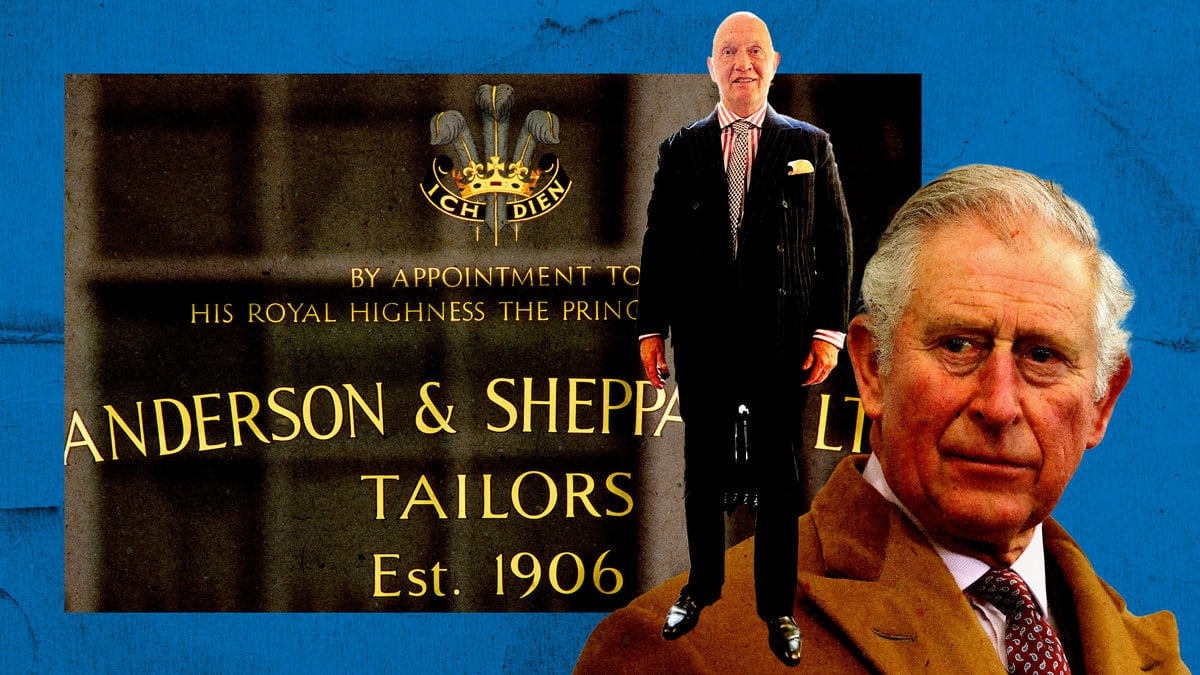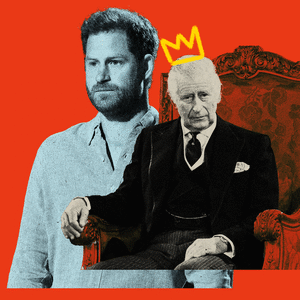The new King of England’s longtime favorite tailor is facing a suit of the legal kind filed by the real-life model for the street smart New York attorney in Tom Wolfe’s novel Bonfire of the Vanities.
In a civil complaint filed on Sept. 20 in Manhattan Supreme Court, Ed Hayes says that as a minority owner of Anderson & Sheppard of London he has come to suspect the company fails to collect sales tax in New York and elsewhere in America. Hayes further raises the possibility that the company is hiding profits.
“The need for an accounting is an urgent matter,” the lawsuit says.
ADVERTISEMENT
And Hayes believes it is his due.
“I own 16 percent,” Hayes told The Daily Beast. “It’s not like I’m nothing.”
A prominent New York attorney who represents Anderson & Sheppard accused Hayes of pulling a kind of reverse Wolfe. The attorney, Larry Hutcher, charged that Hayes is seeking to pass fiction off as real life.
“Ed Hayes, who is obviously familiar with fiction, decided he’d like to write his own make-believe story,” Hutcher told The Daily Beast. “There is no substance to any of the allegations he has raised.”
But nobody disputes that Anderson & Sheppard makes suits that are now quite literally fit for a king.
As attested by the Royal Coat of Arms and the words “By Appointment to HRH the Prince of Wales” on the shop’s plate glass window, Anderson & Sheppard has long been Charles’ suitmaker of choice. He is said to have been introduced to it by Princess Diana in 1983. He is fitted for his suits off-premises at a royal residence—Clarence House or Highgrove House—and had never actually visited the premises until 2013, when he came to meet a group of apprentices.
Other customers have included Winston Churchill, Fred Astaire, Humphrey Bogart, Gary Cooper, Noel Coward and Marlene Dietrich. There is also Hayes, who bought his first two suits there in 1978 after the girlfriend of a hulking New York City stick-up man named Pistol Pete Spriggs presented him with a paper bag of what he terms “hoodlum jewelry.”
U.S. Marshals had arrested Spriggs for possession of a submachine gun and three kilos of cocaine after they burst into his apartment in search of an escapee from the Metropolitan Correctional Center in Manhattan. The marshals said that the super in Spriggs’ building had directed them to the apartment after they showed him a photo of the escapee. But Hayes determined that the super did not speak English and could not have recognized anybody from a photo because he was going blind. A judge threw out the case. And Spriggs expressed his appreciation to Hayes by sending him a sack of rings as jumbo as the stick-up man’s huge hands.
“I could have worn ’em on my big toe,” Hayes later said.
Big rings meant what was known on the street as “much gold.” Hayes sold it all at a store on W. 47th Street and went straight to a payphone to make a transatlantic phone call to Anderson & Sheppard.
“I said, ‘I’m coming over,’” Hayes recalled.
Five years before the future king of England joined Anderson & Sheppard’s long list of noted customers, Hayes arrived at the shop with thousands in hundred-dollar bills stuffed into his left tube sock. He purchased two bespoke suits that made him look more like a gentleman who might be favored by the Queen than like a hustler born in Queens.
“Then I opened my mouth,” Hayes recalled.
Back in New York, the combination of Hayes’ New York City-speak and bespoke suits made him all the more fascinating to the writer Tom Wolfe. Anybody who knew Hayes immediately recognized him as the template for Tom Killian of The Bonfire of the Vanities. Wolfe dedicated the book to “Counselor Eddie Hayes.”
Meanwhile, Hayes continued translating payments from jammed-up clients into $5,000 Anderson & Sheppard masterpieces. A shared passion for sartorial splendor led to a friendship with Norman Halsey, a former British paratrooper who was Anderson & Sheppard’s head salesman and then its managing director, with a 16-percent ownership of the company.
A controlling share of Anderson & Sheppard had been acquired by a corporate raider named Roland “Tiny” Rowland in the 1970s. Rowland’s business style had been described by former British Prime Minister Edward Heath as “the unpleasant and unacceptable face of capitalism.” He at one point also sought to take over Harrods department store, but lost out to Mohamed Al-Fayed, whose son Dodi was romantically involved with Princess Diana at the time of her death.
“Halsey disapproved of Rowland,” Hayes’ suit says.
After Tiny Rowland’s death in 1998 at the age of 80, his daughter Adna Rowland assumed control of Anderson & Sheppard.
“Ms. Rowland eliminated the issuance of dividends to Halsey,” Hayes’ lawsuit contends.
When Halsey retired, he sold his interest in the company to his sartorial soul brother, Hayes.
“Thereafter, I did not receive any dividends despite my stock ownership,” Hayes’ lawsuit says. “The business had been extremely profitable when it was being run by Halsey, but under Ms. Rowland it appears to realize no profits, though its directors are being well compensated.”
Hayes requested and received an annual report for the period ending Jan. 31, 2021. He read that the company suffered a loss of 924,061 pounds (just over $1 million), up from a 27,918-pound loss the year before. The report suggested this was related to the pandemic and the accompanying travel restrictions.
Hayes noted that the directors—seven of whom served the full year— received a total of 353,976 pounds, or 353,976 pounds more than he received in dividends. Hayes did see one mention of sales taxes, but without specific numbers. He recalled that he himself had never been asked to pay them. And he knew the company had long held bi-annual sales trips to New York, where it operates out of the Carlyle Hotel.
“Upon information and belief and based upon my review of the defendant’s annual report, the defendant does not pay any sales tax in NY or any other tax anywhere within the US,” Hayes’ lawsuit says. “I am concerned that sooner or later that Ms. Rowland’s activities and omissions will be discovered and will cause the defendant to incur fines and penalties which will render the defendant insolvent. This will very much affect the value of my stock ownership.”
The lawsuit argues that “an accounting is necessary to determine the true and full information about the financials.” It further contends that “the Defendant has failed and/or refused to provide such accounting so as to conceal the Defendant’s wrongful acts in derogation of the Plaintiff’s rights.”
The company’s attorney, Hutcher, says there is no New York sales tax to pay because there are no sales there.
“Our client does not do business in New York, has no connection to New York,” he told The Daily Beast.
Hutcher was asked about the bi-annual trunk shows the company has long held in not only New York, but other American cities as well.
“They may come here and take some orders, but they haven’t done that in years,” he said. “And even then all of the orders are done, fulfilled in London.”
He was then asked about the upcoming trunk shows presently listed on the company’s website.
“Yeah, but the company is located in London,” Hutcher said. “It doesn’t transact significant business in America. It’s not subject to jurisdiction here.”
On his part, Hayes notes that the upcoming trunk shows include one at the Carlyle Hotel in New York from Oct. 31 to Nov. 4. There is also a show scheduled from Oct. 24 to 25 at the Fairmont Hotel in San Francisco and another from Oct. 27 to Nov. 28 at the Peninsula Hotel in Chicago.
A November 2014 posting on the company website reports on a two-week swing through America.
“Over the fortnight we saw just over 180 customers, the most ever that we have seen since we started the trips. In New York we were seeing between 27-29 customers a day; from 8:30 am to 6:30 pm so we had a lot of jam packed days; but they couldn’t have gone any better….We have such a good client base in the US and we had between 255-260 fittings,” the post said.
The case could turn on what constitutes a sale and where it is taxable. But Hutcher says the company will move to have the case tossed out before it ever reaches such a point.
“We’re gonna move to dismiss the claim and we’re confident it’ll be dismissed,” Hutcher said. “And if he wants to go to London to enforce a claim, God bless him.”
Hutcher added, “If he wants to assert claims regarding his ownership interest, he needs to do it in England where a claim would be properly situated. It’s an English company governed by English law. We don’t even know how he got his shares, whether he actually owns them, but whatever claims he has, he can try to assert them in England.”
Hutcher also argued that Hayes’ allegations of excessive payments to directors have no merit, whatever the venue.
“It’s been nothing like that,” Hutcher said. “He’s making it up as he goes along.”
Hayes says he is determined to press ahead with his lawsuit. He will also continue to don bespoke Anderson & Sheppard suits such as the new King of England might wear.
“I’ve got bigger shoulders,” Hayes said. “He’s got queen’s shoulders. My shoulders are from New York City Queens.”






